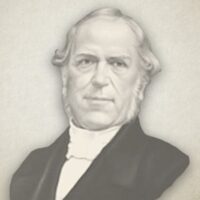
Chapter 3—On Baptism, Answering The Charge Of Disorderliness
Mr. Bridgman: “But as an ordination is a service similar to the first opening or anniversary of a chapel, I for one, nor I alone by many, consider the preacher quite as much breaking the rule of the Apostle, ‘Let all things be done decently and in order,’ as was Joseph in sprinkling an infant in the presence of John Andrew the dipper.”
My Reply:
I never did know, and you are the first person who ever said within my knowledge, that an ordination is a similar service to that of opening a chapel, or to that of an anniversary: for,
1. At an ordination the church is required to give an account of the leadings of Providence, relative to their chosen minister, and this is not required, nor even looked for to be done at the opening of a chapel, or at an anniversary.
2. At an ordination, one minister is appointed, and by us is generally published, to state the nature of a gospel church, and which statement is generally supposed to include the constitution and order thereof. And this part of the service, to be anything at all of what is intended, must be the most decidedly sentimental, and fully descriptive of our real standing as a denomination of any service performed among us, and herein I only fulfilled my appointment. And this is not necessarily expected, though in part frequently performed at the opening of a chapel, but by no means of an anniversary.
3. At an ordination, the chosen minister is requested and expected to give some account of his call by grace, his call to the ministry, and his call to preach in the place then under consideration, and also to state the sentiments he holds, and publicly undertakes in the presence of the then assembled witnesses, by the help of God, to preach and maintain, in doctrines and ordinances, as according to which the church has chosen him to be their pastor. But there can be no place for such a service at an opening or an anniversary, only at the opening of a chapel, the sentiments are frequently stated that are to be maintained in the worship of God in the place, and this I have heard as much of at the opening of an Independent chapel as I have heard at the opening of one by the Baptists, and that without considering it out of order, time, and place. But I feel persuaded that many of the professing public will laugh at your statement that the services of opening a chapel, an anniversary, and an ordination, are so similar, as that what would be out of place at the one, cannot be in good order at the other; and this I say from much practical acquaintance with such services for several years. We always consider it honorable and orderly,’ as the occasion may be, for a man to speak openly, plainly and honestly, the sentiments which he holds in his soul to be the truth before God; but we do not consider it to be in good time, place, nor order, to baptize at an ordination, the opening of a chapel, or at an anniversary, unless public notice be given that arrangements are made for such a service at such a time. And therefore our esteemed friend Irons carried his infant sprinkling out in a manner, in which we, without public notice, should consider among ourselves, confusion and untimely disorder, and more like vaunting pride over our surprised neighbors, than a sober act of religious worship.
John Foreman (1792-1872) was a Strict and Particular Baptist preacher. He was appointed the Pastor of Hill Street Chapel, Marylebone, serving this position for close to forty years.
JOHN FOREMAN'S LIFE AND MINISTRY
JOHN FOREMAN ON DUTY FAITH (COMPLETE)
JOHN FOREMAN'S BAPTISM AND COMMUNION CONSIDERED (COMPLETE)




